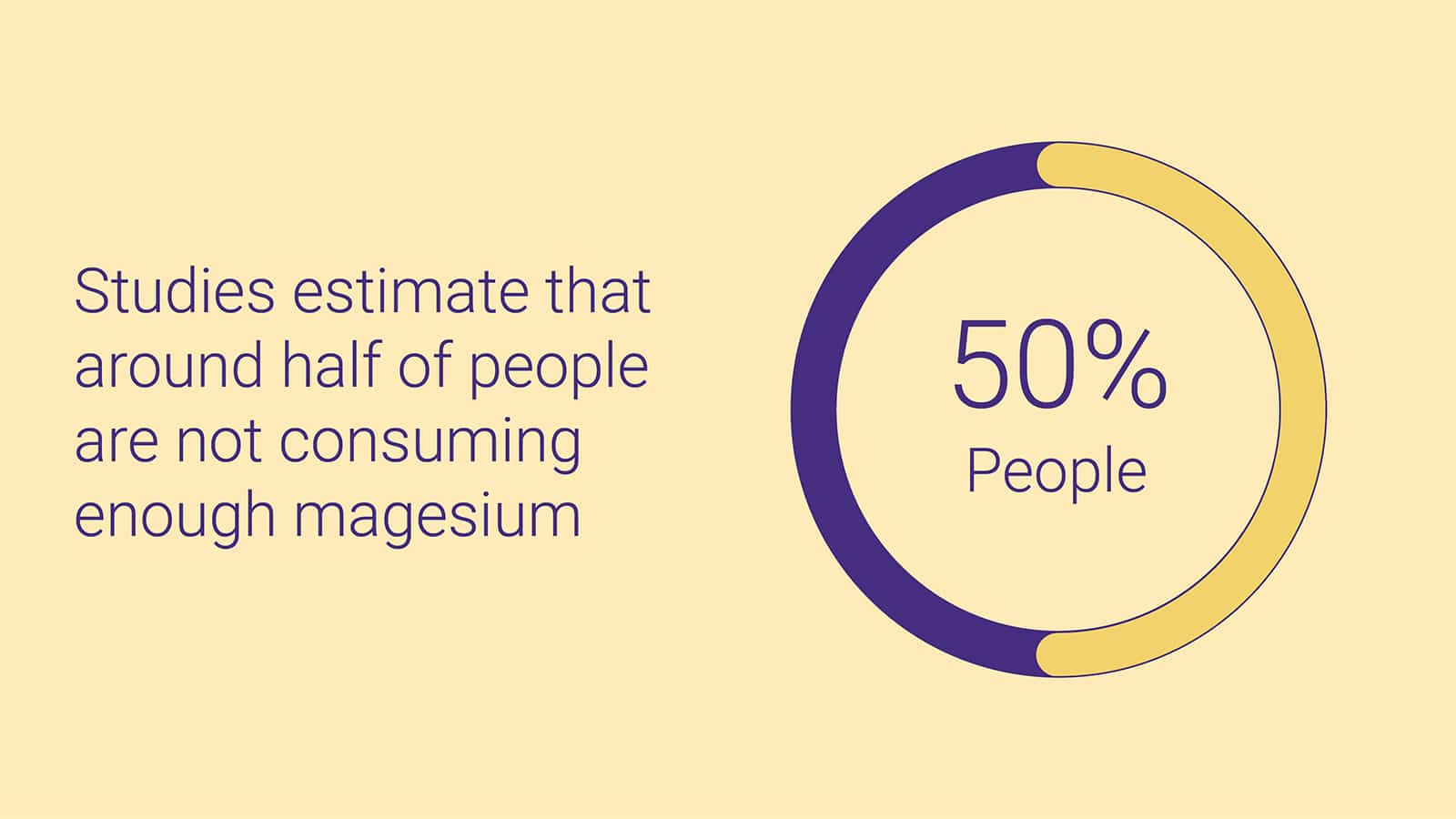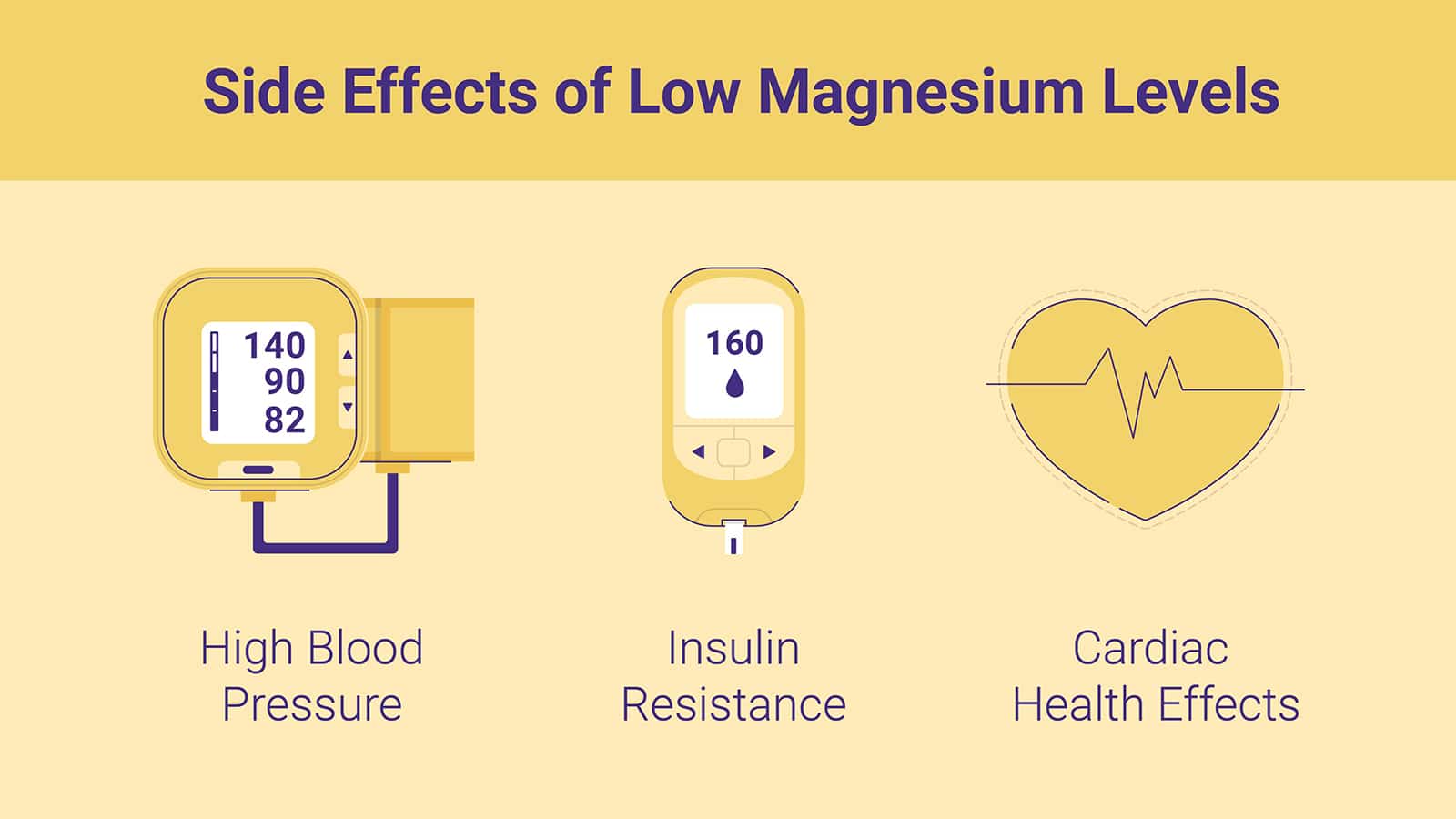
Magnesium and Sleep: A Magnificent Mineral for Better Rest
Dr. David Gao, PharmD., MBA
Dr. David Gao, PharmD., MBA is a licensed pharmacist specializing in oncology and nutrition. He earned his Doctorate of Pharmacy at St. John’s University and completed his Masters of business administration (MBA) at SUNY Oswego. He is a senior pharmacist at Memorial Sloan Kettering Cancer Center.
The link between magnesium and sleep has interested researchers for decades. In fact, studies dating all the way back to the 1950s reference the topic.
It’s one of the most fundamental and basic nutrients. Yet, modern research is finding that magnesium is actually a very busy actor. It plays a role in hundreds of functions, from heart and bone health to metabolism and restful sleep.
Despite its key role in well-being, many people get too little in their diets. And, not getting enough can affect everything from sleep to heart health and more.
Read on to learn about the benefits of magnesium and the risks of not consuming enough. Plus, take a peek at the top sources for your dining table.
The Role of Magnesium in the Body
Magnesium is one of seven critical macrominerals that we must consume from foods, alongside calcium, potassium, sodium, phosphorus, chloride, and sulfur. It also functions as an electrolyte, meaning it carries an electric charge in solution. Electrolytes allow nerves to function and cells to communicate. They also maintain water balance in the body.
A complex system between the intestinal system, kidneys, and bones regulates the balance of magnesium in the body. About 60 percent of the body’s magnesium stores exist in bones and teeth and about 40% is within cells. A very small portion (<1%) freely circulates within the body.
“Magnesium is crucial for the healthy functioning of our parasympathetic nervous system—the component of our nervous system that helps our body achieve a relaxed, rested, or fed state,” says Dr. David Gao, a senior pharmacist at Memorial Sloan Kettering Cancer Center. He adds, “Magnesium is also necessary for regulating our response to stress. Magnesium is required for proper functioning of our hypothalamic-pituitary-adrenocortical (HPA) axis. The HPA axis regulates our body’s production of cortisol (stress hormone), sleep/wake cycle, mood/emotions, and energy expenditure. In addition to calming our nervous system and mitigating stress, sufficient magnesium levels are required for the relaxation of muscle. This one mineral is involved in the production/modulation of our body’s excitatory/calming neurotransmitters, regulation of our stress response, and proper functioning of our brain and muscles.”
This important mineral plays no small role. In fact, it’s involved in over 300 interactions within the human body. A few of the ways your body utilizes magnesium include:
- Biological Clock Function: The relationship between magnesium and biological clocks is a two-way street, in all types of organisms. Low dietary consumption affects the functioning of biological timekeeping. It modulates levels of hormones like cortisol and melatonin, affecting the sleep-wake cycle. Conversely, a dysfunctional biological clock appears to trigger magnesium depletion.
- ATP Molecule Activation: The adenosine triphosphate molecule provides energy at the cellular level for almost every process within the body. It is dependent on magnesium to convert carbohydrates and fats into energy.
- DNA and Enzyme Synthesis: Magnesium is a required element in the synthesis of DNA and RNA, energy synthesis, and antioxidant synthesis.
- Transport of Other Minerals: Ions like potassium and calcium both rely on magnesium to get where they need to go across cell membranes. It plays a role in the communication of nerves, moving muscles, and even keeping a normal heart rhythm.
- Cardiovascular Function: Along with other electrolytes, magnesium regulates nerve impulses and muscle movement. Being a muscle, the heart requires this essential mineral to maintain proper function. High blood pressure and cholesterol levels also show some links to low magnesium levels.
- Bone Growth and Health: Magnesium plays a role in the body’s activation of Vitamin D. This in turn influences calcium and phosphate processes related to bone growth and maintenance.
- Stress and Mental Health: Mental health also appears to have connections to magnesium, easing symptoms of stress, depression, premenstrual syndrome, childhood hyperactivity, migraines and more. Researchers believe its effects are due to inhibiting neurotransmitters like Glutamate which has an excitatory effect on the nervous system.
- GABA Regulation: The neurotransmitter gamma-Aminobutyric acid (GABA) is responsible for inducing relaxation. It plays a critical role in stress relief as well as quality sleep. Magnesium is believed to help facilitate the function of GABA.
- Hearing Health: Along with antioxidants, higher dietary consumption of magnesium reduces the risk of hearing loss. Its relationship with hearing protection isn’t entirely understood but is well-documented.

The Relationship Between Magnesium and Sleep
Researchers continue to uncover more complex links between nutrients and biology. Links between diet, the brain and sleep problems are a particular area of focus. How do our habits affect our health, and vice versa?
Magnesium’s vital role in the body’s internal clock and neurobiology makes it critical for sleep. It’s associated with numerous processes that induce relaxation and help us rest. These complex relationships make it difficult to determine direct cause and effect. But, there are a few interesting trends:
1. People who consume less magnesium may get less sleep.
One large scale study looked at American adults’ eating habits over 10 years. People reporting less than seven hours of sleep had much lower magnesium intakes. These findings were especially true in older adults and women. Another study of Chinese adults linked lower dietary magnesium with more daytime tiredness in adult women, but not adult men.
There have not been many long-term controlled sleep studies on humans. However, a study of rats on a magnesium-deficient diet resulted in less slow-wave sleep and more wakefulness after six weeks. After nine weeks, sleep patterns became significantly disorganized. When dietary magnesium levels returned to normal, so did sleep patterns.
2. Chronic sleep restriction may deplete magnesium, affecting the heart.
Another interesting find is that sleep restriction appears to deplete intracellular magnesium, necessary for heart function. Researchers believe this may play a role in the uptick of conditions like thrombus formation and coronary arterial spasm during sleep deprivation.
One study looked at changes to exercise performance due to sleep restriction. They found noticeable impairments in performance among those with chronic sleep restriction. Performance suffered as the heart rate response showed increased hypersensitivity.
Another similar study observed whether magnesium supplements could mitigate the effects of sleep loss. In the group receiving magnesium, intracellular levels remained stable during sleep restriction. They also did not exhibit decreased exercise performance like the non-supplement group showed.
Researchers believe that increased cardiovascular sensitivity during chronic sleep restriction relates to the decrease in intracellular magnesium.
3. Chronic stress impairs sleep and is tied to magnesium levels as well.
Chronic stress has also been found to reduce magnesium levels in the body. As with poor sleep, chronic stress increases the risk of cardiac events. What’s more, stress and poor sleep have a two-way relationship of their own. This makes the stress-sleep dynamic a key area of focus for cardiac researchers.
One Japanese study looked at the effect of stress on university students. During final exams, students underwent a month of high stress and sleep deprivation. The chronically stressed students exhibited both restricted vasodilation and decreased magnesium levels.
4. Certain sleep disorders may have connections to magnesium.
Obstructive sleep apnea involves breathing impairments during sleep. This disorder disrupts sleep cycles several times each night. These interruptions significantly affect people’s quality of rest. Research finds people with obstructive sleep apnea tend to have lower magnesium levels, as well as higher levels of inflammation.
Parasomnias like Restless Leg Syndrome also may have links to this nutrient. Electrolyte minerals control nerves and muscle function. When electrolyte imbalances happen, this can cause cramping, spasms, and contractions. These sensations can make it difficult to relax and fall asleep.

Side Effects of Low Magnesium Levels
As you can see, magnesium is a critical mineral for health. Its vital role in numerous functions makes it indispensable. Yet, studies estimate half of us aren’t getting enough in our diets.
What’s more, low levels of dietary magnesium are associated with several undesirable health conditions. The Institute of Medicine lists the following based on current scientific research:
- Calcium and Vitamin D Deficiency: Magnesium and calcium are closely intertwined. Over time, magnesium deficiency often leads to low calcium levels. Both low calcium and low magnesium levels may also affect the body’s ability to utilize Vitamin D.
- Neuromuscular Hyperexcitability: Low magnesium may cause generalized seizures, muscle cramps or spasms in the hands and feet, and other neurological signs.
- Cardiac Health Effects: Several studies indicate that balanced diets correlate with reduced risk of heart problems over time. Low magnesium is linked with a wide range of cardiac abnormalities like arrhythmias, chest pain, and degeneration. Some cardiac medications may deplete magnesium levels, making the effects of this mineral important to study.
- High Blood Pressure: Several studies find that low magnesium diets increase the risk of high blood pressure. Research has also found that increasing dietary magnesium by adding fruits and vegetables lowers blood pressure.
- Osteoporosis Risk: Research shows some links between diets low in magnesium and increased risk of osteoporosis. This is most strongly observed in post-menopausal women.
- Diabetes Management and Insulin Resistance: Depleted magnesium levels are linked with insulin resistance, abnormal glucose tolerance, and effects on insulin secretion. Insulin resistance also appears to increase urinary magnesium loss, meaning there could be a relationship.
- Inflammation: Low magnesium is linked to chronic inflammatory stress in the body. Research suggests that low magnesium may exacerbate the effects of oxidative stress and other factors like poor sleep.
How Do You Know if You’re Getting Enough?
Foods are the leading source of magnesium for people. In fact, this nutrient must come from our diets as the body does not produce it. However, studies estimate that around half of people are not consuming enough. There is also evidence that foods contain lower concentrations of minerals compared to 60 years ago.
Older people tend to consume even less magnesium, although their dietary need is actually higher than younger adults. Certain conditions like gastrointestinal diseases and diabetes also increase the risk of deficiency. High levels of zinc supplements, dehydration, and low protein intake may also affect the body’s ability to absorb enough magnesium.
In order to determine if your magnesium levels are healthy, doctors usually perform a blood or urine test. Concerned about your diet or potential symptoms? Be sure to discuss this with your physician.
Some potential signs of being low on magnesium include:
- Fatigue
- Muscle spasms
- Weakness
- Nausea or appetite Loss
- Numbness/Tingling
- Arrhythmia
Recommended Daily Amounts
As with most nutrients, consuming a balanced diet is sufficient for the majority of healthy people to stay healthy. The Dietary Reference Intakes manual published by the Institute of Medicine establishes daily intake guidelines::
| Age | Males (per day) | Females (per day) |
| Infants, 0-6 months | 30 mg | 30 mg |
| Infants, 7-12 months | 75 mg | 75 mg |
| Children, 1-3 years | 80 mg | 80 mg |
| Children, 4-8 years | 130 mg | 130 mg |
| Children, 9-13 years | 240 mg | 240 mg |
| Teens, 14-18 years | 410 mg | 360 mg |
| —– During Pregnancy | —- | 400 mg |
| —– Breastfeeding | —- | 360 mg |
| Adults, 19-30 years | 400 mg | 310 mg |
| —– During Pregnancy | —- | 350 mg |
| —– Breastfeeding | —- | 310 mg |
| Adults, 31+ years | 420 mg | 310 mg |
| —– During Pregnancy | —- | 360 mg |
| —– Breastfeeding | —- | 320 mg |
Top Dietary Sources of Magnesium
Curious to integrate more magnesium-rich foods into your family’s diet? Leafy greens, nuts, legumes, and fortified grains tend to be the best bets. The following are the leading sources of this important nutrient, according to the U.S. Department of Agriculture’s database:
- Leafy greens: spinach, kale, chard, collard greens
- Seeds: pumpkin, hemp, flax, and sesame seeds
- Beans: lima beans, white beans, black-eyed peas, kidney beans, chickpeas, lentils, edamame, soy/tofu
- Fish: tuna, mackerel, pollock
- Whole grains: brown rice, wild rice, quinoa, bulgur, buckwheat
- Nuts: almonds, brazil nuts, cashews, pinenuts, walnuts
- Fruits: bananas, avocados, guava, dried fruits, kiwi, blackberries
- Dairy: yogurt, milk
- Dark chocolate
- Coffee/espresso
- Molasses

Magnesium Supplements
Magnesium supplementation is sometimes recommended for people with insomnia and other sleep concerns. Experts do not definitively agree on the effectiveness of supplementation for sleep, however.
One study of older adults examined if magnesium citrate supplements could improve sleep. All study participants had poor sleep quality, and 58% consumed less than the daily recommended dietary intake of magnesium. Those who consumed less were more likely to have a higher body mass index. They also showed more inflammatory markers of chronic stress. Researchers found that supplements did increase magnesium levels in people with deficiencies, and also reduced inflammation markers. The study did not find definitive ties to improvement in sleep quality, however.
A separate small study involved elderly adults with insomnia. The researchers found that, while magnesium did not affect total sleep time, it did offer modest improvements for insomnia symptoms and staying asleep. Another study looking at the effects of magnesium supplements on nighttime leg cramps found no measurable difference beyond a placebo effect.
Can You Get Too Much?
The risk of consuming too much magnesium from foods is quite low for healthy people. An excess amount of magnesium is generally removed from the body by the kidneys.
Consuming high doses from supplements can result in nausea and laxative-like effects, though. Magnesium supplements may also interact with certain types of medications. These include magnesium-rich supplements, osteoporosis medications, some antibiotics, diuretics, and proton pump inhibitor-type antacids. Always consult with your physician regarding changes to supplements and diet.
The Takeaway
Magnesium is a vital mineral for health and wellness. It protects our heart, bones, and nervous system. It enables our biological clocks and brains to function properly. In doing all of this, magnesium helps us sleep better and stress less.
Want to make the most of this mineral? Incorporate plenty of mineral-rich foods into your diet, practice healthy sleep habits, and keep an eye on stress. Together, these things help prevent magnesium depletion and fuel your body.

